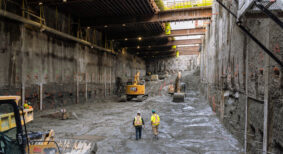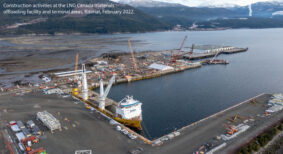The growing housing affordability crisis is at the forefront of conversations across Canada. Decades of underinvestment in housing is catching up and having significant impacts, according to Independent Contractors and Businesses Association (ICBA) president Chris Gardner.
“We’re building less homes now than 50 years ago,” he said, explaining that between2019-2022, Canada built an average of 200,000 new homes annually. In 1972, Canada built 232,000 new homes.
Gardner cited recent bleak reports from RBC, CMHC and CIBC that indicate how many homes need to be built annually between now and 2030 to meet the demand for housing. According to RBC, Canada will need to build 800,000 new homes, while CIBC states one million new homes are needed.
Gardner said a “war time effort of cooperation and collaboration at all levels of government” is needed to address this challenge. He noted while lots of policy announcements have been made relating to housing – often they are conflicting so more coordination is required.
Housing and B.C.’s new legislation were discussed further by the panel of mayors at the annual Buildex Vancouver CEO Breakfast. Ken Sim, Brenda Locke and Mike Hurley, representing three of the biggest cities in Metro Vancouver, shared their thoughts on Bill 44.
The B.C. government introduced legislation (Bill 44) last year to address the housing crisis, reduce construction delays and streamline processes. The bill increases density across most B.C. municipalities.
On July 1, 2024, developers will be able to start building a minimum of three and up to six units (near transit) on lots currently zoned for single-family homes and duplexes in municipalities with more than 5,000 people.
“While we have some challenges with some of the legislation that is proposed, there’s no perfect answer,” said Sim, mayor of Vancouver. “We’re going at it 100 miles per hour. We’re going to be densifying in the right spots.”
Surrey Mayor Locke and Burnaby Mayor Hurley were not as optimistic, expressing concerns about the increased density potentially putting a strain on existing infrastructure.
“I think it’s an overreach by the government. I don’t like the legislation,” said Locke. “Every city is unique and I don’t think the legislation respected that. It’s disrespectful to single family neighbourhoods. Surrey does not have the infrastructure – schools, hospitals – but we’re building quickly.”
Hurley acknowledged there are some positives to the legislation but didn’t think the one-size-fits-all approach to housing was a good idea.
All three mayors said their cities are working diligently to expedite development permitting and processes to address the housing shortage.
“Our job is to make sure you can get a permit as quickly as possible so we can de-risk your projects so you can build more housing faster,” said Sim, adding his goal is to make the permit process “super simple.”
In Burnaby, Hurley said the goal is to cut the permitting time down by 50 per cent. He advised that they have a form where if all the boxes are ticked, the project will move quickly through city hall.
“A single family home in Burnaby right now if all boxes are ticked, it’s five weeks to process,” he said. “We’re trying to shorten those times and we will shorten those times but it works both ways: quality in – quality out.”
While there are no easy solutions, the housing crisis is being compounded by the ongoing skllled labour shortage in the construction industry. Contractors continue to cite labour shortage as a major challenge.
Gardner said B.C.’s population is declining and retirements mean the industry is losing experience. It’s an enormous challenge so what needs to happen?
“We need to be smarter about how our immigration system operates,” he urged. “We are not doing a good job bringing people in and recognizing credentials.”
Despite challenges and economic uncertainty, 87 per cent of B.C. construction companies expect 2024 to be as busy – or even busier – than last year, which is surprising, said Gardner.
On the international stage, he discussed how Canada continues to rank poorly against other countries, highlighting the Port of Vancouver and LNG investments as examples.
According to the World Bank and S&P Global Market Intelligence, Canada’s largest container port ranks at No. 347 out of 348.
LNG is another story of under-investing in infrastructure, said Gardner. The U.S. has soared to the top for exporting LNG while Canada lags behind.
Significant challenges are showing up in every metric when Canada is ranked against its peers and we’re falling behind, he said. We need to do better.
Cheryl Mah is managing editor of Construction Business.









